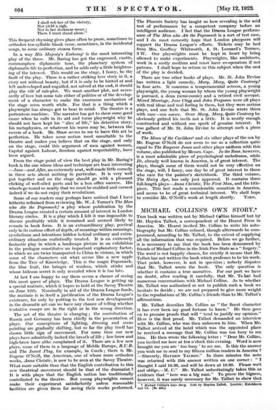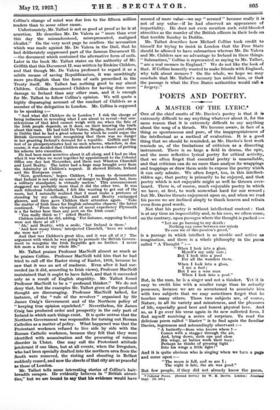MICHAEL COLLINS'S OWN STORY.*
Two book was written not by Michael Collins himself but by Mr. Hayden Talbot, a correspondent of the Hearst Press in America. Mr. Hearst invited Mr. Collins to write his auto- biography but Mr. Collins refused, though afterwards he com- promised, according to Mr. Talbot, to the extent of supplying all the information that was required. Before we go further, it is necessary to say that the book has been denounced by friends of Michael Collins in the Irish Free State as a " forgery." The word is not happily chosen, for strictly it means that Mr. Talbot has not written the book which professes to be his work. That point, however, is not in question ; nobody disputes that Mr. Talbot wrote the book. The only question is whether it contains a true narrative. For our part we have no doubt, after reading it carefully, that Mr. Talbot had numerous conversations with Michael Collins. As to whether Mr. Talbot was authorized or not to publish such a book we hesitate to decide ; we are not prepared to give more weight to the repudiations of Mr. Collins's friends than to Mr. Talbot's affirmations. • Mr. Talbot describes Mr. Collins as " the finest character it has ever been my good fortune to know." He then goes on to promise proofs that will " tend to justify my opinion." Here is the first proof. Mr. Talbot demanded an interview with Mr. Collins, who was then unknown to him. When Mr. Talbot arrived at the hotel which was the appointed place he received a message that Mr. Collins was too busy to see him. He then wrote the following letter : " Dear Mr. Collins, you invited me here at ten o'clock this evening. Word is now brought me you are ' too busy' to see me. Is this the answer you wish me to send to my fifteen million readers in America ? —Sincerely, HAYDEN TALBOT." In three minutes the note was returned with this answer written on one corner : I thought I said 10.30, and will be down at 10.80. Please wait and oblige.—M. C." Mr. Talbot unhesitatingly takes this as evidence that " here was a big man." To prove the bigness, however, it was surely necessary for Mr. Talbot to show that • Michael Canines Civil Slop, Told by Hayden Talbot. London: Hutchinson and Co. lea. net.)
Collins's change of mind was due less to the fifteen million readers than to some other cause.
Unfortunately, Mr. Talbot is not so good at proof as he is at assertion. He describes Mr. De Valera as " more than ever this day the misunderstood, misrepresented, maligned idealist." On the very next page he confirm , the accusation which was made against Mr. De Valera in the Dail, that he bad deliberately suppressed part of the famous Document II. —the document which contained the alternative form of oath. Later in the book Mr. Talbot states on the authority of Mr. Griffith that this Document II. was written by Erskine Childers, and that though Mr. De Valera professed to regard it as a subtle means of saving Republicanism, it was unwittingly more pro-English than the form of oath prescribed in the Treaty itself. Mr. Talbot has nothing good to say about Childers. Collins denounced Childers for having done more damage to Ireland than any other man, and it is enough for Mr. Talbot to follow Collins's opinion. We will quote a highly disparaging account of the conduct of Childers as a member of the delegation to London. Mr. Collins is supposed to be speaking :-
" And what did Childers do in London ? I risk the charge of being indiscreet in revealing what I am about to reveal—but con- siderations of that kind cannot weigh with me when the fate of the Irish people depends, as it does, on their knowing the truth about this man. He had told De Valera, Brugha, Stack and others in Dublin that he had a great scheme by which he could argue the British Government into recognizing that there was no danger in her granting Ireland's demand for a republic. Griffith and the rest of us plenipotentiaries had no such scheme, wherefore, in due course, it was decided that Childers should have a chance of putting his scheme into execution.
He had been most secretive about it all along, and I had no idea what it was when we went together by appointment to the Colonial Office one day last November, and there met Winston Churchill and Lord Beatty. The latter had a huge map brought over from the Admiralty at Childers's request. It showed Britain, Ireland and the European coast.
Now, gentlemen,' began Childers, g I mean to demonstrate that Ireland is not only no source of danger to England, but, from a military standpoint, is virtually useless.' This announcement staggered me probably more than it did the other two. It was such ridiculous balderdash, I felt like wanting to get out of the room, but I naturally realized that I must make a pretence of standing by my colleague. Churchill and Beatty exchanged glances, and then gave Childers their attention again. ' Take the matter of Irish bases for English submarine chasers,' the latter continued. 'From the viewpoint of naval expediency Plymouth is a far better base than any port on the Irish coast.'
You really think so ? ' asked Beatty. Childers insisted he did, adding, For instance, supposing Ireland were not there at all t'
Ah,' said Beatty, with a smile, but Ireland is there.' And how many times,' interjected Churchill, have we wished she were not 1'
And that was Childers's great idea, and it was all of it The argument with which he was going to persuade the British Govern- ment to recognize the Irish Republic got no further. I never felt more a fool in my whole life." •
Mr. Talbot praises Professor MacNeill almost as much as he praises Collins. Professor MacNeill told him that he had tried to call off the Easter rising of Easter, 1916, because he saw that it was an act of madness. Even after it had suc- ceeded (as it did, according to Irish views), Professor MacNeill maintained that it ought to have failed, and that it succeeded only as a result of English stupidity. Mr. Talbot found Professor MacNeill to be a " profound thinker." We do not deny that, but the examples Mr. Talbot gives of the profound thought are discouraging. Professor MacNeill talked, for instance, of the " rule of the revolver " organized by Sir James Craig's Government and of the Northern policy of " keeping true opinion squelched." Nevertheless, Sir James Craig has produced order and prosperity in the only part of Ireland in which such things exist. It is quite untrue that the Northern Government was responsible for turning out Roman Catholics as a matter of policy. What happened was that the Protestant workmen refused to live side by side with the Roman Catholic workmen, because they felt that they were identified with assassination and the procuring of ruinous disorder in Ulster. One may call the Protestant attitude intolerant if one likes, but at all events, when the Irregulars, who had been specially drafted into the northern area from the South were removed, the rioting and shouting in Belfast suddenly ceased, and now the streets of that city are as peaceful As those of London.
Mr. Talbot tells some interesting stories of Collins's hair- breadth escapes. He evidently believes in " British atroci- ties," but we are bound to say that his evidence would have
seemed of more value—we say " seemed " because really it is not of any value—if he had observed an appearance of impartiality. He doeS not even mention such cold-blooded atrocities as the murder of the British officers in their beds on that terrible Sunday in Dublin.
Mr. Talbot describes how Michael Collins took credit to himself for trying to insist in London that the Free State should be allowed to have submarines whereas Mr. De Valera and Mr. Childers saw no advantage to Ireland in these things. " Submarines," Collins is represented as saying to Mr. Talbot, " are a real menace to England." We do not like the look of that. If Collins honestly wanted to make friends with England, why talk about menace ? On the whole, we hope we may conclude that Mr. Talbot's memory has misled him, or that the passage is what the Free States authorities would call a " forgery."



















































 Previous page
Previous page